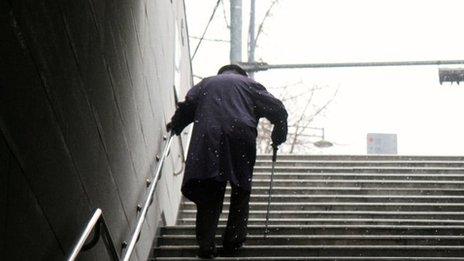Many vulnerable people denied care, says Age UK
- Published

A "catastrophic" situation is developing in England with many vulnerable elderly people being denied care, campaigners say.
An analysis by Age UK found the proportion of over-65s getting help had fallen by a third since 2005-6.
Last year, under 900,000 over-65s got help - one in 10 people in that group - compared with 15% seven years ago.
The review - based on published data - estimated at least 800,000 older people were going without vital help.
This includes council-funded help in the home with daily tasks such as washing, dressing and eating as well as care home places.
Age UK blamed the squeeze on funding, which had forced councils to reduce budgets by 15% in real terms over the past three years to £6.6bn.
The report - the charity's annual review of the state of social care - said this had resulted in councils increasingly rationing services. Just 13% of local authorities now provide help to people with moderate needs compared with nearly half in 2005-6.
'More money'
Age UK charity director Caroline Abrahams said: "The figures we have uncovered in this report are catastrophic.
"Older people who need help and are now not getting it are being placed at significant risk and families who care for loved ones are experiencing intolerable strain."
Vivian washes, dresses and cares for Bill 24 hours a day
She said this did not make financial sense either as being denied this type of care increased the risk of expensive hospital admissions.
The government is attempting to ease the pressure on the system by creating a pooled £3.8bn budget with the NHS next year to encourage greater co-ordination and then in 2016 the cap on care costs will be introduced.
But Ms Abraham said this would have limited benefit because the system was so underfunded.
A Local Government Association spokeswoman said: "The shortage of funding is being exacerbated by increasing demand.
"To substantially raise the standard of care on a nationwide basis, more money needs to be put into the system."
Care and Support Minister Norman Lamb said social care was a "priority" for the government and the reforms would make a difference.
"Both our health and social care services need to work differently to respond to the needs of our ageing population - we need to focus on keeping people well and living independently for as long as possible," he added.
- Published5 March 2014
- Published15 October 2013
- Published8 October 2013
- Published7 October 2013
- Published13 February 2013
- Published5 October 2013